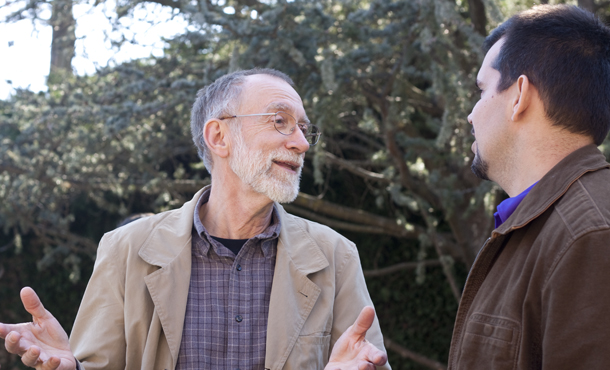Six years after conferring its first award for “global nonviolence” work on Desmond Tutu, followed by a second award in 2009 to Jimmy and Rosalynn Carter, the Mahatma Gandhi Center for Global Nonviolence at James Madison University is inaugurating a new award to highlight individuals from the local community whose lives epitomize the promotion of “justice and nonviolence through education, scholarship and engagement.”
The first honorees of this new “community service” award are two people with close ties to Eastern Mennonite University: (1) Howard Zehr, PhD, a semi-retired faculty member, who is being recognized for his seminal role in the foundation and promotion of the field of restorative justice around the world, and (2) Vida Huber, PhD, a 1961 graduate of EMU who chaired EMU’s nursing program from 1967 to 1984 and then held leadership roles at JMU until her sudden death in 2005.
Zehr is currently co-directing, with EMU professor Carl Stauffer, the Zehr Institute for Restorative Justice at EMU, established in the fall of 2012. Zehr began teaching restorative justice at EMU’s Center for Justice and Peacebuilding in 1996, but recently stepped away from teaching. He served as the center’s co-director for five years, 2002-2007.
Zehr’s longevity in the field of restorative justice, global renown, and early book on the subject (Changing Lenses– A New Focus for Crime and Justice, published in 1990) has caused him to be dubbed the “grandfather of restorative justice.” He is the author, co-author or editor of 22 books, plus the source of dozens of chapters, op-ed pieces, and other presentations.
In wide demand around the world, Zehr has given restorative justice presentations in 35 states and 25 countries. As an example, Zehr has done eight speaking tours in New Zealand, a country that has restructured its juvenile justice system to put restorative conferences at its core, with remarkable results.
On the local level, JMU’s director of judicial affairs, Josh Bacon, PhD, is one who has been influenced by Zehr. In a blog posted on March 18, 2011, Bacon wrote: “I as well as many others who have practiced student discipline in the university setting thought we knew what restorative justice was. Well, after studying with the ‘grandfather’ of the field, Howard Zehr, I can say, ‘I was extremely wrong’ in my understanding of restorative justice.” He continued:
Learning about the principles and practices of restorative justice has transformed my view of the potential of student discipline and re-energized my professional focus. I have seen restorative justice challenge our students in a new way and transform their view of conflict and relationships.
I have seen many negative, harmful incidents go through restorative processes and come out the other side with transformed students and community members. This is not something people involved in student discipline are used to seeing, and I believe higher education is just beginning to discover the potential of restorative justice practices in creating educated and enlightened citizens.
At the time of her death, Vida Huber was an associate dean of JMU’s College of Integrated Science and Technology (CISAT). She was also director of JMU’s Institute for Innovation in Health and Human Services and professor of nursing.
“Vida was very much committed and motivated to help bring about opportunities on this campus where individuals preparing to be professionals in various health and human services fields could learn to work together,” said JMU provost Jerry Benson, who was dean of CISAT at the time of Huber’s death.
The Mahatma Gandhi Center’s Global Nonviolence Community Service Award is conferred in recognition of “visionary leadership and enduring commitment to the creation of a more compassionate, equitable and caring community,” said Gary S. Race, director of the Gandhi Center. He anticipates that the community service award will be given every second year, alternating in the future with the center’s global nonviolence award, which has not been awarded since 2009.
The community service awards officially will be conferred in a by-invitation ceremony at JMU on Oct. 2, 2013, a day that corresponds with the birthday of Gandhi. Vida’s husband, retired EMU staff member Harold E. Huber, will accept his wife’s posthumous award.
